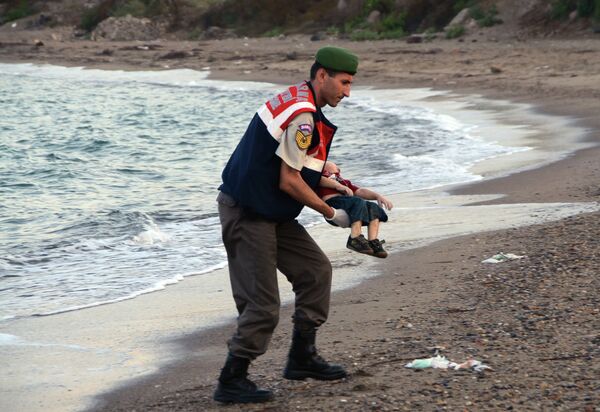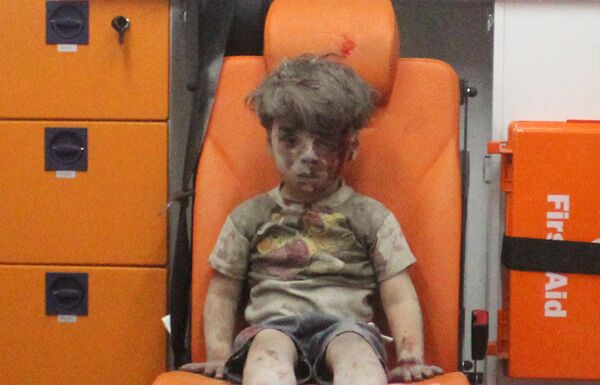A year to the day and Oxfam say that compared to 4664 deaths recorded in 2015, over 5700 people have died on migrant routes around the world since the start of 2016.
That is a staggering one every 80 minutes since the start of 2016.
Despite the worrying statistics rising, the heart-breaking picture of young Kurdi seemed to be a catalyst for a collective shift in public awareness. Following it, the political discourse and the narrative across social media shifted almost immediately.

Francesco D'Orazio, co-founder of audience intelligence firm Pulsar, provided some analysis on the online shift following the picture being shared.
"Our analysis shows a huge increase in awareness about the refugee crisis following Alan Kurdi's death. More people are discussing the issues on social media and searching for information and news on Google," D'Orazio told Oxfam.
Migrants add value to the economy and are a net benefit. 90% of migrants are refugees (UNHCR). The UK isn't full. #refugeeswelcome
— Mohammed Ansar (@MoAnsar) September 2, 2016
Pulsar found a subsequent rise in interest in the refugee issue on Twitter, with four times as many tweets on the subject than in the year before. The #refugeeswelcome hashtag began trending worldwide in the days after Alan Kurdi's death and has been used 2.35 million times in the 12 months since.
Strong support for unaccompanied children from all corners of Britain urging Home Office to do more #refugeeswelcome pic.twitter.com/ZbAFEqyCRM
— Esmat J (@Esmat_J) September 2, 2016
Similar visuals — such as that of Omran Daqneesh more recently — the child pictured bloodied and covered in dust after being pulled from the rubble of his apartment block in Aleppo, have had a similar effect, showing the strength of public feeling about the realities of violence and war forcing innocent refugees to flee.

Shaheen Chughtai, the Deputy Head of Humanitarian Policy at Oxfam, told Sputnik about the impact of media narratives on the public:
"It can often feel that there is a sense of public apathy from the many visual images that everyone sees from conflict zones. But it is important that people understand the reality of what people on the ground are going through and the insight of NGOs' and journalists' reporting is crucial as part of the process."
Speaking about the response of European leaders, Chughtai said:
"There is much positive action also taking place by government representatives and leaders across Europe to make a difference. Lots of generosity is also being shown when it comes to the shared responsibility needed for all countries in Europe. Regarding any countries who are shunning their responsibility in any way, the public need to continue the dialogue and challenge this."
Global #refugee and migrant deaths up more than 20% since death of #AlanKurdi https://t.co/LvL5lNYPG3 #StandAsOne pic.twitter.com/BodYDdP8bv
— Oxfam International (@Oxfam) September 2, 2016
Oxfam is calling on the UK government to commit to welcoming more refugees and helping poorer countries, which are sheltering the majority of refugees.
"The vast majority of people fleeing conflict zones are in desperate need and it is of no fault of their own that they are caught up in situations forcing them to flee their homes," Chughtai told Sputnik.
"Most do not wish to leave their homes and if they do, many hope that one day they will get the opportunity to return. What we are seeing before us is a large-scale humanitarian disaster and this is why collective responsibility is crucial sooner rather than later."
Away from the rising statistics and increase in deaths, there is some positive light seen in the last year. In addition to the efforts by charities, there is also an increase in grassroots aid groups that have been set up to respond to the crisis. Some have been founded by the public and funded by thousands through crowd-funding and a range of other sources.
We all deserve to be treated with dignity & respect: https://t.co/5VOvUXmtg2 #StandAsOne w/ people forced to flee pic.twitter.com/5UCorXIWMx
— Oxfam International (@Oxfam) September 2, 2016
Many such groups are working on the ground in Greece, Calais and the Balkans — reaching refugee camps where much work is needed for people who have already arrived to European destinations but are left in a state of limbo.


